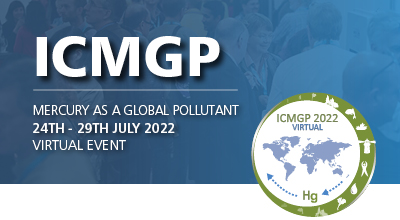| Abstract Title: | PREVALENCE OF THE GENES INVOLVED IN METHYLMERCURY DEGRATION AND MERCURY REDUCTION IN THE GLOBAL DEEP OCEAN. |
| Presenter Name: | Andrea G. Bravo |
| Company/Institution: | Institute of Marine Sciences, Spanish National Research Council (CSIC) |
| Session: | Special Session - Meta-omic and geochemical approaches to linking microbial activity to biogeochemical mercury cycling |
| Day and Session: | Friday 29th July - Session Two |
| Start Time: | 09:30 UTC |
| Co-Authors: | Andrea G. Bravo,Isabel Sanz-Saez,Joan-Mart¡ Carreras,Olga S nchez,Josep M. Gasol,Clara Ruiz-Gonz lez,Marta Sebasti n,Carlos M. Duarte,Pablo S nchez,Silvia Acinas |
Abstract Information :
Microbes are important drivers of biogeochemical processes determining the fate of mercury (Hg) in the aquatic systems. In particular, they have a relevant role on formation and degradation of methylmercury (MeHg) but also on the reduction of inorganic divalent Hg (HgII) to elemental Hg0. Yet, little is known about the diversity and expression of the organisms involved in MeHg demethylation and HgII reduction, which are carried out by the merB and merA genes, respectively. we explored the distribution of these genes in 290 marine heterotrophic bacteria (Alteromonas and Marinobacter spp.) isolated from different oceanographic regions and depths, and assessed their tolerance to diverse concentrations of Hg2+ and MeHg. Moreover, we explore the temperate global deep ocean metagenomes and metatranscriptomes of the Malapasina 2010 circumnavigation from two different plankton size fractions (0.2-0.8u ?m and 0.8-20 ?m), commonly referred to the life-style of free-living and particle?attached microorganisms, respectively. We observed that the abundance patterns of merA and merB responded to the life-style of the organism, with higher abundance in the particle-attached size fraction, as well as the oceanographic basin. Interestingly, the metatranscriptomes revealed that expression patterns of merA and merB genes differed with their corresponding abundances. For example, merA and merB expression patterns in the Canary Islands basin were significantly lower in particle-attached compared to the free-living fraction. Alteromonas and Pseudoalteromonas (gammaproteobacteria) were important contributors to both the abundance and expression of merA and merB at a global scale. This study represents the first global deep ocean analysis of the merAB genes and transcripts and reveals the main players involved in the divalent-Hg reduction and MeHg degradation in the marine Hg biogeochemical cycle.



